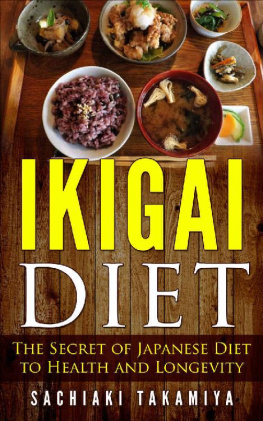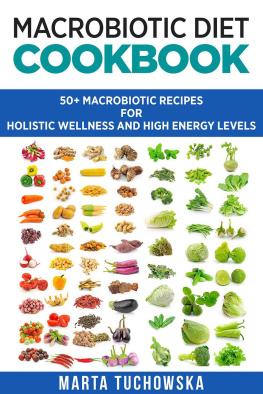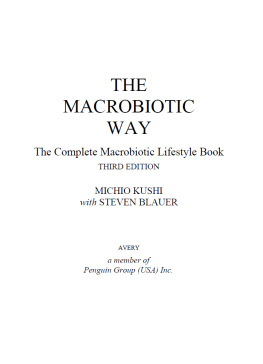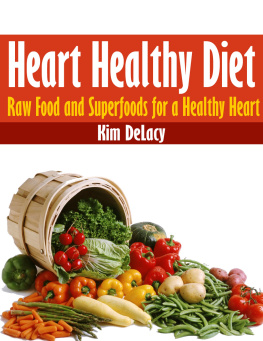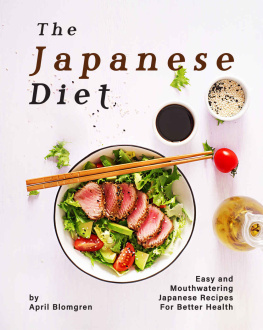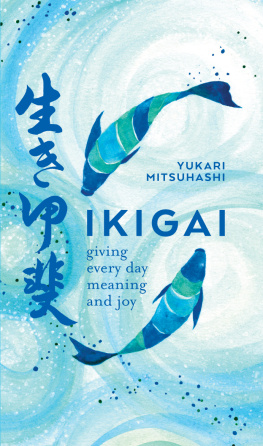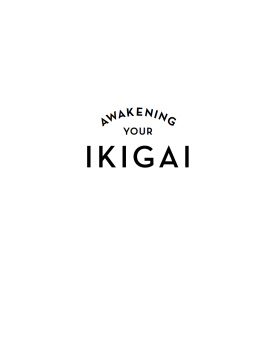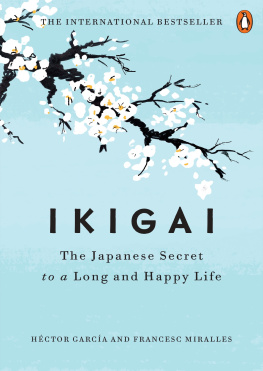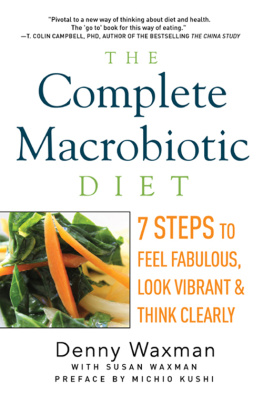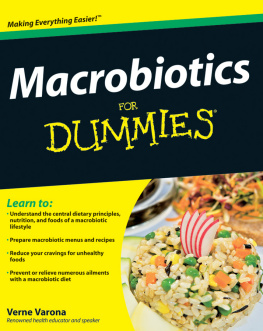Table of Contents
Chapter 1: Who Are the Healthiest People in the Country with the Longest Life Expectancy?
It is said that the Japanese People have the lowest mortality rate in the world and it is a lot to do with our diet. Meantime Washoku which has the worldwide reputation of being healthy and delicious has been registered as a UNESCO Intangible Cultural Heritage of Humanity. Sushi bars and Tempura restaurants are drawing crowds in streets of London, New York, and Paris. Yes, Japanese food is becoming the icon of healthy diet.
While I agree on half of this trend, I must say not all Japanese cuisines are good and not all Japanese people are role models of longevity and well-being.
A lot of foods in Japan such as sukiyaki, ramen, or even sushi arent healthy in my opinion: Both sukiyaki and ramen contain meat, and the traceability of fish used in sushi isnt clear, especially in conveyor belt sushi. The foods served at most restaurants and sold at most supermarkets include food additives, and the vegetables are not organically grown.
Young generations have lost in touch with traditional Japanese diet which is often referred to as the cause of our long life, and therefore they cant be the role model anymore. They eat at MacDonalds, Kentucky Fried Chicken, and Yoshinoya which is a Japanese fast food restaurant chain serving beef bowls.
Having said that, the way average Japanese people eat is still relatively healthier compared to the way average people eat in countries in the West, in terms of the amount of food we eat and proportion of carbohydrate-based food, vitamin based food, and protein-based food. We eat much less compared to American people for example, and that is seen in the amount of each serving at fast food restaurants, when we compare the two countries. Most meals in Japan whether they are breakfast, lunch, or dinner contain some vegetables, and we dont have the custom to have food with sugar such as muffins or pancakes as breakfast, nor do we have the tradition to have dessert after dinner.
Even so, they are no match for health-conscious people in Europe and North America, and you are better off learning from these people in your own country.
Satoyama Living
If there is anyone you can learn from, you want to look into old generations, since the centenarians who often appear in the longevity books belong to this category. Most of them hardly ever eat fast food I mentioned earlier, they usually eat traditional foods such as rice, miso soup, pickles, boiled or seasoned vegetables, fish, and soybean-based foods like tofu or Natto.
This traditional diet is still common among senior citizens in the countryside all over Japan whether they live in Okinawa Prefecture, which was featured in Ikigai: The Japanese secret to a long and happy life, or Shiga Prefecture which was ranked number one in the national longevity ranking in 2017, or Nagano Prefecture which is often ranked high in the same ranking.
When I looked at the lifestyle of the centenarians in Okinawa, it looked similar to that of the old people in Shiga Prefecture where I live, and we have 692 centenarians. As a matter of fact, there are quite a few prefectures which are ranked higher than Okinawa in this national ranking. So, I dont think this low mortality rate is only relevant to Okinawa; it is seen throughout Japanese countrysides.
I think it is to do with our traditional Japanese lifestyle which I call Satoyama living, where we led a self-sufficient life growing rice and vegetables, and cutting trees in the mountains for firewood or building houses. In this lifestyle, we worked vigorously in the rice field, the vegetable field, and in the mountains, we ate organically and locally grown rice and vegetables, we made fermented foods at home and surrounded ourselves with effective bacteria, we belonged to a neighborhood community to support one another, and we lived with a sense of life purpose as being a Shintoist and Buddhist.
These elements are similar to the factors contributing to longevity among the centenarians in Okinawa described in the book Ikigai: The Japanese secret to a long and happy life. The only difference I can think of is the fact that people in Okinawa enjoy dancing and they are more joyful people in general, which probably added to the factors of their long life. But other than that, Satoyama life seems to be the key and many of the old people in Japanese countrysides still retain this lifestyle for a certain degree regardless of their prefectures. I have lived in Shiga Prefecture, Nagano Prefecture, and Tochigi Prefecture and witnessed the Satoyama lifestyle among senior citizens there.
Therefore, if you want to model someone, elderly people in Japanese rural areas are the people you are looking for.
Nevertheless, they dont necessarily have healthier diet than natural food eaters in your countries because they eat white rice instead of brown rice, they eat regular vegetables instead of organic vegetables. Yes, they retain Satoyama lifestyle to a certain degree, but a lot of the good essence has been lost, unfortunately. They had organic diet when they were younger, but they can no longer have access to foods with pure natural ingredients since our way of food production has changed. And yet they dont try to do anything about it. They are not health conscious people. They happened to be well because they just followed their tradition and the tradition was good, but when the social norm changed to be using agricultural chemicals or composts of cattle eating genetically modified corns, or fertilizers contaminated by radiation, they also changed by continuing to follow it without questioning.
So who should we look up to?
There is a growing population of people who are conscious of their health in Japan, and those people have studied the traditional diet as well as having up to date scientific information about wellness. They eat radiation free organic food, macrobiotic food, fermented food, and many of them live in the countryside to lead sustainable ways of living. They grow rice and vegetables using organic farming, natural farming, and permaculture. They inherited the tradition of Japanese natural way of living which is central to most Japanese martial arts; healing arts such as Shiatsu, Reiki or acupuncture; Zen; and the macrobiotic diet. Moreover, they are young people who are flexible enough to break away from the rigid structure of the tradition and to incorporate modern approaches into their practice. In my opinion, they are the healthiest people in Japan.
I am a founder of Zen and a Way of Sustainable Prosperity which is a philosophy to help you become sustainably prosperous, healthy, and happy. In ZENWSP, we practice what is called modeling: If you want to gain some skill, the most effective way is to model the best of the best in the field. Therefore, if you want to achieve longevity and wellness, the optimal way is to learn from the most balanced people in the healthiest country in the world. Ikigai Diet I am going to introduce here is the diet of these naturally conscious people in Japan. You will feel Ikigai when you follow this diet because you become healthy and happy as well as making society happy. What do I mean by that? Why does diet have anything to do with making society happy and why is it related to your Ikigai?
Chapter 2 Ikigai and Sanpo-Yoshi
Ikigai means worth living, rewarding, or fulfilling. You can find Ikigai in almost anything as long as you feel joy and meaning in that activity.: You can feel Ikigai when you jog in the morning, you can feel Ikigai when you play with your children, and you can feel Ikigai when you are immersed in a work you love.
However, if we look into Ikigai deeper, to interpret it to be a meaning in our lifeor a purpose in our life, we need to go beyond our subjective feeling of enjoyment or fulfillment. We need to understand the structure of society, and expand our consciousness to feel what happiness really is. Can it be Ikigai if your company makes profits by exploiting others even though your job is so satisfying for you? Can it be Ikigai when you enjoy your hobby so much that you prioritize it over your family? What really is happiness for us? What is our purpose in life? Ikigai I am talking about here isnt just rewarding to you, but it is also satisfying to your family and people around you, and gratifying to society. Another word for Ikigai to give justice to its true meaning, it needs to have the element of Sanpo-Yoshi.

